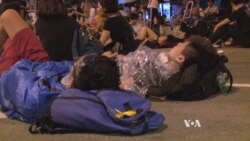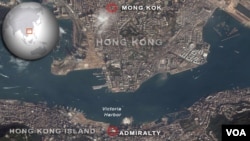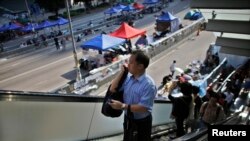After more than a week of protests that paralyzed parts of Hong Kong, student leaders have established a framework with government officials to discuss their political reform demands.
The breakthrough comes as intense pro-democracy demonstrations subsided Monday, allowing government workers back into their offices.
Lester Shum of the Hong Kong Federation of Students set the terms of any future talks between city leadership and the protesters in a Monday meeting with a government official.
As part of the framework, the two sides agreed that the Hong Kong government would be required to carry out any deals reached in meetings.
Another preliminary talk will be held between the two sides on Tuesday in Hong Kong.
"Other details like the specific topics and the venue of the talks would have to be worked out at another meeting tomorrow night," said Shum.
Hong Kong's Chief Executive Leung Chun-ying said Monday that the government is "sincere in having dialogue on constitutional development" with the protesters, who are demanding Beijing not vet the territory's political candidates.
Simmering demonstrations
As the sun rose Monday over Hong Kong, an incredulous cheer spread among the hundreds of students who had slept the night on the financial district’s streets. Many demonstrators had feared riot police would try to forcibly remove them.
Demonstrators said they believe the reason Leung did not send out forces to clear the streets is because students met one of the leader’s two conditions for negotiations to begin: allowing civil servants back into the central government office complex.
Not all is back to normal in Hong Kong. Some schools and businesses remain closed, and Leung urged people on Monday to leave the Mong Kok district, where violent clashes occurred over the weekend.
The protests are the most serious unrest in Hong Kong since Beijing took control of the former British colony in 1997.
Leung had issued a televised statement, urging people to leave the Mong Kok district, where violent clashes occurred over the weekend, and said that the government is "sincere in having dialogue on constitutional development."
"People have now gathered in Mong Kok again. The likelihood of clashes between people holding strong but different views is constantly increasing,” Leung said.
“To prevent violent crimes from happening and minimize injuries and fatalities, the police will take actions at a suitable time. I would, in particular, advise students, onlookers and other people to leave the highly dangerous area as soon as possible,” he said.
Leung also said, "We are sincere in having dialogue on constitutional development.”
Skepticism reigns
Just a week after riot police fired tear gas at the democracy activists, many were unsure the campaign would get this far.
A recently awoken Jane Chow, 27, is one of those.
She said she remains skeptical about the government’s intentions, and expects riot police to use force to evict the protesters in the coming days.
“That’s very likely to happen, yes. But if they're smart, they won’t do it in a way that is overly violent. Even if the government tries to clear out the protest, I don’t think that at least on the side of the protesters there will be any violence,” Chow said.
Demonstrators said they believe the reason Leung did not send out forces to clear the streets is because students met one of the leader’s two conditions for negotiations to begin: allowing civil servants back into the central government office complex.
Workers return
By 9 a.m. Monday, hundreds of civil servants were flowing out of the nearby metro station to their office, with student marshals ensuring them a clear path.
One woman, who refused to give her name, was unimpressed. She berated the activists for not allowing workers to resume their duties sooner.
The elderly government cleaner complained the students do not realize that these are hard times and that she and other government workers have jobs to do and livelihoods to protect.
Overseeing the marshals, Lam Ming said it might be increasingly hard for the movement to maintain community support. He insisted, however, that the activists have not made too many concessions to Leung, with nothing to show in return.
“You can say that we concede quite substantially in letting civil servants come to work. It is [now] their [government's] responsibility to give way on the negotiation table," Ming said. "I don’t think in the foreseeable future the protesters will be willing to concede the roads."
By late Monday afternoon, about a hundred protesters remained in an area that houses offices for international banks as well as the main stock exchange, although some students on campus remained defiant and promised to return after classes in the evening.
“I hope students can persist. If we retreat now we will lose the power to negotiate,” said Chow Ching-lam, studying on the ground at the protest site near Leung's offices.
Ivan Broadhead filed from Hong Kong for this report, and some material came from VOA's Conatonese service and Reuters.








